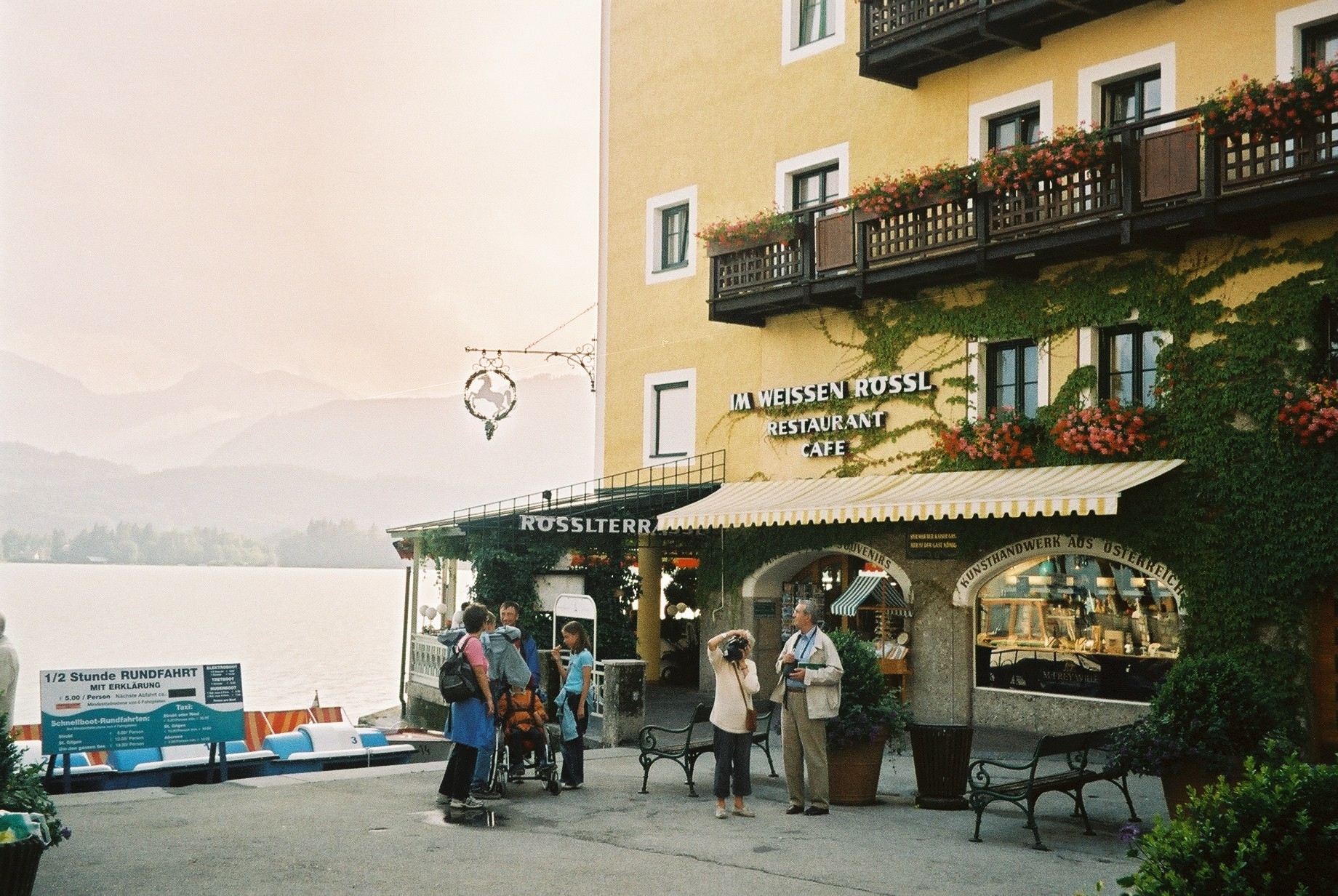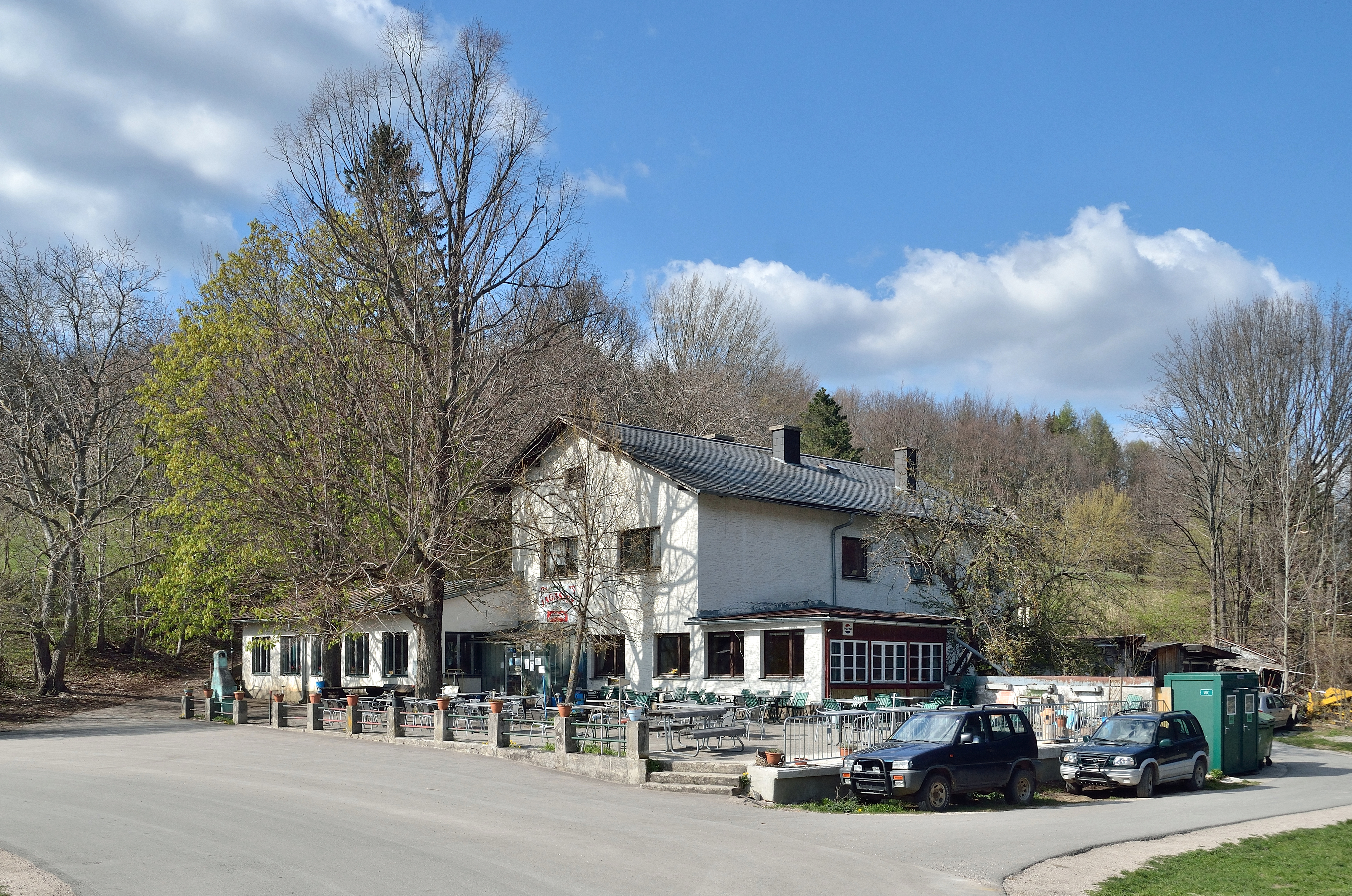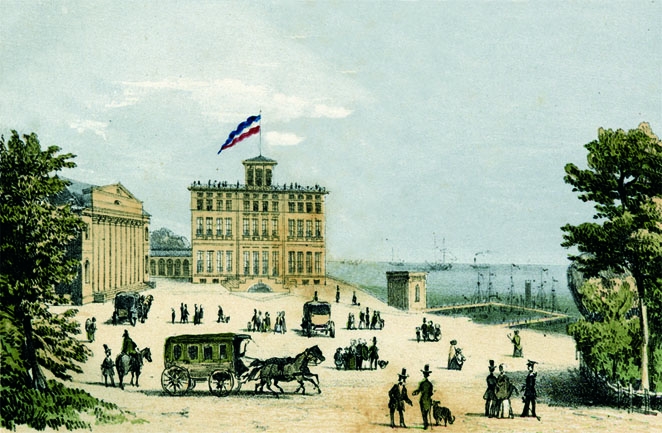|
Lake Wolfgang
Lake Wolfgang (german: Wolfgangsee) is a lake in Austria that lies mostly within the state of Salzburg and is one of the best known lakes in the Salzkammergut resort region. The municipalities on its shore are Strobl, St. Gilgen with the villages of Abersee and Ried as well as the market town of St. Wolfgang in the state of Upper Austria. The town and the lake are named after Saint Wolfgang of Regensburg, who, according to legend, built the first church here in the late 10th century. Overview Lake Wolfgang stretches about 10.5 kilometres from the northwest to the southeast. It is divided into two parts by a peninsula, called ''die Enge'' (the Narrow), situated roughly in the middle of its southern shore opposite St. Wolfgang, where the breadth is no more than 200 metres. The western portion of the lake at St. Gilgen is known as the ''Abersee''. The lake has an area of about 12.9 to 13.1 km² and is surrounded by the Salzkammergut mountain range. On the northern side ... [...More Info...] [...Related Items...] OR: [Wikipedia] [Google] [Baidu] |
Schafberg (Salzkammergut)
Schafberg (1,783 m) is a mountain in the Austrian state of Salzburg. Situated within the Salzkammergut Mountains range of the Northern Limestone Alps, the Schafberg rises at the shore of Wolfgangsee Lake. Tourism During the summer, the '' Schafbergbahn'', a rack railway that opened in 1893, runs from the small town of St. Wolfgang im Salzkammergut St. Wolfgang im Salzkammergut is a market town in central Austria, in the Salzkammergut region of Upper Austria, named after Saint Wolfgang of Regensburg. Geography The town is located in central Austria. It is on the northern shore of the Wo ... on the shores of the Wolfgangsee to the summit. The peak offers a panoramic view of the Salzkammergut mountains and its lakes and is also the site of a hotel called ''Schafbergspitze'', established in 1862. Gallery Aerial photo of Schafberg 2.JPG, Schafbergspitze Aerial photo of Schafberg 1.jpg, Aerial view of the summit St. Gilgen - Schafberg, West-Panoramablick.JPG, Tavern at the ... [...More Info...] [...Related Items...] OR: [Wikipedia] [Google] [Baidu] |
Peninsula
A peninsula (; ) is a landform that extends from a mainland and is surrounded by water on most, but not all of its borders. A peninsula is also sometimes defined as a piece of land bordered by water on three of its sides. Peninsulas exist on all continents. The size of a peninsula can range from tiny to very large. The largest peninsula in the world is the Arabian Peninsula. Peninsulas form due to a variety of causes. Etymology Peninsula derives , which is translated as 'peninsula'. itself was derived , or together, 'almost an island'. The word entered English in the 16th century. Definitions A peninsula is usually defined as a piece of land surrounded on most, but not all sides, but is sometimes instead defined as a piece of land bordered by water on three of its sides. A peninsula may be bordered by more than one body of water, and the body of water does not have to be an ocean or a sea. A piece of land on a very tight river bend or one between two rivers is sometimes ... [...More Info...] [...Related Items...] OR: [Wikipedia] [Google] [Baidu] |
Christoph Schlingensief
Christoph Maria Schlingensief (24 October 1960 – 21 August 2010) was a German theatre director, performance artist, and filmmaker. Starting as an independent underground filmmaker, Schlingensief later staged productions for theatres and festivals, often accompanied by public controversies. In the final years before his death, he staged Wagner's ''Parsifal'' at the Bayreuth Festival and worked at several opera houses, establishing himself as a ''Regietheater'' artist. Early life and education Schlingensief was born on 24 October 1960 in Oberhausen. His father was a pharmacist and his mother a pediatric nurse. As a child, he worked as an altar server and already made short films with a hand-held camera. Having passed his ''Abitur'' exams, he twice failed to gain admission to the University of Television and Film Munich. From 1981 he studied German language and literature, philosophy and art history at Ludwig-Maximilians-Universität München, but also dabbled as a musician and fin ... [...More Info...] [...Related Items...] OR: [Wikipedia] [Google] [Baidu] |
Helmut Kohl
Helmut Josef Michael Kohl (; 3 April 1930 – 16 June 2017) was a German politician who served as Chancellor of Germany from 1982 to 1998 and Leader of the Christian Democratic Union (CDU) from 1973 to 1998. Kohl's 16-year tenure is the longest of any German chancellor since Otto von Bismarck, and oversaw the end of the Cold War, the German reunification and the creation of the European Union (EU). Further, Kohl's 16 years and 30 day tenure is the longest for any democratically elected Chancellor of Germany. Born in 1930 in Ludwigshafen to a Catholic family, Kohl joined the CDU in 1946 at the age of 16. He earned a PhD in history at Heidelberg University in 1958, and worked as a business executive before becoming a full-time politician. He was elected as the youngest member of the Landtag of Rhineland-Palatinate, Parliament of Rhineland-Palatinate in 1959 and from 1969 to 1976 was Minister-president, minister president of the Rhineland-Palatinate state. Viewed during the 1960s ... [...More Info...] [...Related Items...] OR: [Wikipedia] [Google] [Baidu] |
Idyll
An idyll (, ; from Greek , ''eidullion'', "short poem"; occasionally spelt ''idyl'' in American English) is a short poem, descriptive of rustic life, written in the style of Theocritus' short pastoral poems, the ''Idylls'' (Εἰδύλλια). Unlike Homer, Theocritus did not engage in heroes and warfare. His idylls are limited to a small intimate world, and describe scenes from everyday life. Later imitators include the Roman poets Virgil and Catullus, Italian poets Torquato Tasso, Sannazaro and Leopardi, the English poet Alfred, Lord Tennyson ('' Idylls of the King''), and Nietzsche's '' Idylls from Messina''. Goethe called his poem '' Hermann and Dorothea''—which Schiller considered the very climax in Goethe's production—an idyll. Terminology The term is used in music to refer generally to a work evocative of pastoral or rural life such as Edward MacDowell's ''Forest Idylls'', and more specifically to a kind of French courtly entertainment (''divertissement'') of the ... [...More Info...] [...Related Items...] OR: [Wikipedia] [Google] [Baidu] |
Heimatfilm
' (, German for "homeland-films"; German singular: ') were films of a genre popular in Germany, Switzerland, and Austria from the late 1940s to the early 1960s. ''Heimat'' can be translated as "home" (in the geographic sense), "hometown" or "homeland". History The genre came to life after the devastation of Germany in World War II, and remained popular from the late 40s to the early 60s. The films suggested a whole, romantic world untouched by war and the hazards of real life. The Berlin-based studio Berolina Film was the driving force behind the development of ''Heimatfilme''. In the immediate post-World War II era, the idea of ' is linked to the experience of loss of more than twelve million Germans, known as Vertriebene, who were displaced from the former eastern territories of Germany in its pre-1938 borders. Contemporary concerns with expulsion and re-integration become manifest in many of the more than three hundred ' that were produced during the 1950s. This is particularl ... [...More Info...] [...Related Items...] OR: [Wikipedia] [Google] [Baidu] |
Ralph Benatzky
Ralph Benatzky (5 June 1884 – 16 October 1957), born in Mährisch Budwitz ( Moravské Budějovice) as Rudolph Franz rantišekJosef Benatzky, was an Austrian composer of Moravian origin. He composed operas and operettas, such as '' Casanova'' (1928)'', Die drei Musketiere'' (1929), '' Im weißen Rössl'' (1930) and '' Meine Schwester und ich'' (1930). He died in Zürich, Switzerland. Works * ''Laridon'' (1911) * ''Cherchez la femme'' (1911) * ''Der lachende Dreibund'' (1913) * ''Anno 14'' (1914) * ''Prinzchens Frühlingserwachen'' (1914) * ''Liebe im Schnee'' (1916) * ''Die tanzende Maske'' (1918) * ''Die Verliebten'' (1919) * ''Apachen'' (1920) * ''Ein Märchen aus Florenz'' (1923) * '' Casanova'', with music by Johann Strauss II (1928) * ' (1929) * '' Im weißen Rößl'' (1930) * '' Meine Schwester und ich'' (1930) * ''Zur goldenen Liebe'' (1931) * ''Zirkus Aimée'' (1932) * ''Büxl'' (1932) * '' Bezauberndes Fräulein'' (1933) * ''Reichste Mann der Welt'' (1935) * ''D ... [...More Info...] [...Related Items...] OR: [Wikipedia] [Google] [Baidu] |
The White Horse Inn
''The White Horse Inn'' (or ''White Horse Inn'') (German title: ''Im weißen Rößl'' ) is an operetta or musical comedy by Ralph Benatzky and Robert Stolz in collaboration with a number of other composers and writers, set in the picturesque Salzkammergut region of Upper Austria. It is about the head waiter of the White Horse Inn in St. Wolfgang who is desperately in love with the owner of the inn, a resolute young woman who at first only has eyes for one of her regular guests. Sometimes classified as an operetta, the show enjoyed huge successes in the West End (651 performances at the Coliseum starting 8 April 1931), as a Broadway version, and was filmed several times. In a way similar to ''The Sound of Music'' and the three '' Sissi'' movies, the play and its film versions have contributed to the popular image of Austria as an alpine idyll—the kind of idyll tourists have been seeking for almost a century now. Today, ''Im weißen Rößl'' is mainly remembered for its son ... [...More Info...] [...Related Items...] OR: [Wikipedia] [Google] [Baidu] |
Operetta
Operetta is a form of theatre and a genre of light opera. It includes spoken dialogue, songs, and dances. It is lighter than opera in terms of its music, orchestral size, length of the work, and at face value, subject matter. Apart from its shorter length, the operetta is usually of a light and amusing character. It sometimes also includes satirical commentaries. "Operetta" is the Italian diminutive of "opera" and was used originally to describe a shorter, perhaps less ambitious work than an opera. Operetta provides an alternative to operatic performances in an accessible form targeting a different audience. Operetta became a recognizable form in the mid-19th century in France, and its popularity led to the development of many national styles of operetta. Distinctive styles emerged across countries including Austria-Hungary, Germany, England, Spain, the Philippines, Mexico, Cuba, and the United States. Through the transfer of operetta among different countries, cultural cosmo ... [...More Info...] [...Related Items...] OR: [Wikipedia] [Google] [Baidu] |
Gasthaus
A Gasthaus (also called ''Gasthof'', ''Landhaus'', or ''Pension'') is a German-style inn or tavern with a bar, a restaurant, banquet facilities and hotel rooms for rent. Gasthäuser are typically found in smaller towns and are often family-owned. It is common for three generations of a family to work together in such an establishment, and many have been owned by the same family for generations. Gasthäuser are common in Germany, Austria, Switzerland, and other countries in Europe around Germany. Some are decorated with mural paintings (called Lüftlmalerei) depicting fairy tale stories or local legendary figures. Etymology Specifically translated a Gasthaus means "guest house" in German. Gasthof is a variation of the word, Landhaus means "country house" (though is essentially the same concept, just in a rural setting) and Pension means "boarding house" or small hotel. Lunch and dinner (''Mittagessen und Abendessen'') are usually served to the public, but breakfast (''Frühs ... [...More Info...] [...Related Items...] OR: [Wikipedia] [Google] [Baidu] |
Resort Town
A resort town, often called a resort city or resort destination, is an urban area where tourism or vacationing is the primary component of the local culture and economy. A typical resort town has one or more actual resorts in the surrounding area. Sometimes the term ''resort town'' is used simply for a locale popular among tourists. One task force in British Columbia used the definition of an incorporated or unincorporated contiguous area where the ratio of transient rooms, measured in bed units, is greater than 60% of the permanent population. Generally, tourism is the main export in a resort town economy, with most residents of the area working in the tourism or resort industry. Shops and luxury boutiques selling locally themed souvenirs, motels, and unique restaurants often proliferate the downtown areas of a resort town. In the case of the United States, resort towns were created around the late 1800s and early 1900s with the development of early town-making.Crewe, Ka ... [...More Info...] [...Related Items...] OR: [Wikipedia] [Google] [Baidu] |
Gondola Lift
A gondola lift is a means of cable transport and type of aerial lift which is supported and propelled by cables from above. It consists of a loop of steel wire rope that is strung between two stations, sometimes over intermediate supporting towers. The cable is driven by a bullwheel in a terminal, which is typically connected to an engine or electric motor. It is often considered a ''continuous system'' since it features a haul rope which continuously moves and circulates around two terminal stations. In contrast, an aerial tramway operates solely with fixed grips and simply shuttles back and forth between two end terminals. The capacity, cost, and functionality of a gondola lift will differ dramatically depending on the combination of cables used for support and haulage and the type of grip (detachable or fixed). Because of the proliferation of such systems in the Alps, the it, Cabinovia and french: Télécabine are also used in English-language texts. The systems ... [...More Info...] [...Related Items...] OR: [Wikipedia] [Google] [Baidu] |



.jpg)

.jpg)


